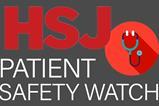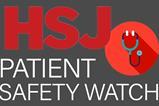HSJ is now hosting the Patient Safety Watch newsletter, written by Patient Safety Watch chief executive James Titcombe.
Good afternoon and welcome to the latest edition of the Patient Safety Watch newsletter.
Duty of candour to be reviewed
The Department of Health and Social Care has announced a review into the duty of candour. The duty – also known as “Robbie’s Law” – has been in place for NHS providers since 2014 and for all other Care Quality Commission-regulated providers since 2015 and is set out in regulation 20 of the Health and Social Care Act 2008 (Regulated Activities) Regulations 2014.
Parliamentary and Health Service Ombudsman Rob Behrens welcomed the announcement, saying: “Despite it being a statutory duty to be open and honest when things go wrong with a patient’s care, I know from the cases we investigate that this doesn’t always happen. Patients and their families deserve better.”
My view? It’s now almost a decade since duty of candour came into force, yet as Mr Behrens highlights, a lack of openness and honesty when things go wrong sadly remains a theme in far too many cases. A process that takes a hard look at what more can be done to change this is welcome but the key to success is likely to go beyond any statutory duty on its own.
Fostering a culture that supports openness and honesty in healthcare is a complex challenge that requires all parts of the system to pull in the same direction. Regulations and punitive levers will only ever have a limited impact. We also need to look at pre-registration education, leadership and the role of the wider system (including litigation, regulation, coronial and criminal systems) and how these can better support the wider culture change needed.
I’d also like the review to consider whether the statutory duty should be extended to require healthcare providers to share information about known patient safety risks and problems with patients, families and communities proactively. If such information was shared openly (rather than sitting on internal risk registers), perhaps patients and their families would be empowered to make more informed choices about their care and to be active participants in their safety.
Government rejects ‘Hillsborough law’ reforms
As reported in the Guardian, ministers have rejected the “Hillsborough Law” reforms – prompted by the 1989 disaster which killed 97 people and brought about by campaigning by their families to prevent future police cover-ups – instead opting for a “Hillsborough charter” to promote openness and transparency from departments after public tragedies.
The charter includes the following commitments for police and public authorities (which includes NHS organisations) to:
- “Place the public interest above reputation” after a public tragedy;
- Approach inquests and public inquiries “with candour, in an open, honest and transparent way”;
- “Not knowingly mislead the public or media”; and
- “Avoid seeking to defend the indefensible or to dismiss or disparage those who may have suffered where we have fallen short”.
The Independent Inquiry into Maternity Services at East Kent also recommended the Hillsborough Law. Helen Gittos, who lost her daughter Harriet in 2014 following failures at the trust, told me: “This isn’t only about Hillsborough. For the Home Office to announce this under the cover of Boris Johnson’s testimony to the covid enquiry is… insulting. The East Kent families ought also to have been warned.”
Improving how we improve
Mary Dixon-Woods and THIS Institute’s brilliant work is now a regular feature of this newsletter, and this edition is no exception. Professor Dixon-Woods and colleagues have published an important paper in the British Medical Journal looking at the quality and reporting of large-scale improvement programmes in English NHS maternity services.
The research concludes “poor transparency of reporting and weak or absent evaluation” were undermining large-scale improvement programmes in maternity services by “limiting learning and accountability”.
As discussed in previous newsletters, the annual “cost of harm” in our maternity services is around £4.2bn (2022-23 data from NHS Resolution), and regular readers will know that sadly stories featuring poor maternity care and growing concerns about maternity safety are often covered. Let’s hope this research sparks efforts to improve how large-scale quality improvement initiatives are implemented and evaluated in future.
Maternity Safety Support Programme to be reviewed
In timely news, NHS England has signalled the Maternity Safety Support Programme will be “fully” reviewed. It has placed a job advert (closing date 20 December) for a band 9 nurse to lead a four-month project to “deliver a full review of the MSSP, including governance and assurance mechanisms” and “make recommendations for future running of the programme, considering contemporaneous issues in maternity services”.
In other news this edition…
Safety watchdog calls for better GP continuity of care
The Health Services Safety Investigations Body has called for better GP continuity of care after a cancer patient endured months of multiple primary care appointments with different professionals before it was recognised his cancer had spread.
The safety watchdog said continuity of care could refer to either a patient being seen by a specific GP or their information being stored and handled in such a way that their care would be consistent regardless of who they saw.
Remote GP appointments linked to ‘deaths and serious harms’, researchers find
Research published in the BMJ Quality and Safety journal has found that, although such incidents were rare, remote GP consultations had resulted in “deaths and serious harms”.
The researchers examined 95 safety incidents from complaints, settled indemnity claims and reports, as well as carrying out interviews with those working in primary care. They found examples of where remote consultations had led to “missed, inaccurate or delayed diagnoses, underestimation of severity or urgency, delayed referral, incorrect or delayed treatment, poor safety netting and inadequate follow-up”.
Recalling a near miss, one GP interviewed for the study said: “I’ve remembered one father that called up. Really didn’t seem to be too concerned… when I did a video call, you know this child… looked really, really poorly. And it was quite scary actually that, you know, you’d had the conversation and if you’d just listened to what dad was saying, actually, you probably wouldn’t be concerned.”
Patient care affected by poor NHS communication
A report by think tank Demos – entitled I love the NHS, but…, inspired by a phrase the researchers continuously encountered while carrying out their work – found more than half (55 per cent) of the people they surveyed had experienced poor communication from the NHS in the last five years while around a tenth (11 per cent) said their care or treatment had been impacted because of an admin or IT error.
The researchers found these communication problems typically manifested in three ways: being unable to navigate care because it was unclear what communication to expect from whom and when; admin errors leading to people being given inaccurate or erroneous information; and staff being unable to communicate internally or advise on next steps because they did not know enough about a patient’s medical history.
The report added: “Sometimes, these experiences can be fleeting or quite minor… But often poor communication is more serious. Over and over again we heard stories from patients and staff of critical appointments missed, diagnoses not shared or shared too late, and referrals for treatment that simply went missing.”
Coroner calls on health secretary to intervene over emergency care deaths for second time
Cornwall and Isles of Scilly coroner Andrew Cox has written to DHSC to warn the emergency care problems in his local area are “too big for hospital or ambulance trusts to fix on their own” and have led to multiple preventable deaths.
Such a move by a coroner would normally be considered rare. However, this is the second time Mr Cox has sent DHSC a prevention of future deaths report covering multiple fatalities caused by delayed ambulance responses and long handovers upon ambulances arriving at the hospital, having raised similar concerns last year.
Meanwhile, data from NHSE this fortnight revealed ambulance handover delays have increased in several areas – including Cornwall and other parts of the South West – despite falling 22 per cent nationally compared with the same period last year.
NHS leaders lack the data needed to keep patients safe
In case anyone missed it, HSJ has published a write-up of a recent high-level Patient Safety Watch roundtable discussion. This event brought together leaders from key organisations in patient safety across England to discuss progress made over the past year.
The meeting was attended by senior representatives from organisations including NHSE, the PHSO, NHS Resolution, the office of the Patient Safety Commissioner, the General Medical Council, the Nursing and Midwifery Council, HSSIB and Action Against Medical Accidents. Six key themes emerged:
- Despite consensus on data’s importance in patient safety, data sharing continues to be a challenge.
- There has to be a cultural shift from focusing on patient safety incidents to understanding patient safety across the continuum of care.
- Change happens when organisations have aligned priorities.
- While the opportunities for improvement are infinite, resources are not. Being pragmatic about where to focus resources is as difficult as it is crucial.
- A long-term workforce plan for social care must be prioritised. While the Workforce Plan for the NHS should be celebrated, an integrated long-term workforce plan that includes social care will be crucial to addressing patient safety issues that occur at the intersection of health and social care.
- The workforce matters for safety and safety matters for the workforce.
Sharing some good stuff…
Before signing off for this newsletter, I’d like to highlight this blog from Paul Whiteing, Action against Medical Accidents’ (relatively) new chief executive. I’m sure most readers will already be aware of AvMA and the fantastic work it does. Paul took over from the previous AvMA chief executive Peter Walsh just over a year ago – big shoes to fill indeed! Paul’s blog shares some great insights and reflections from his first year in the role and is well worth a read.
The final share for the edition is another plug for AvMA and its fantastic “Implementing the Duty of Candour and PSIRF with Empathy” course. I know from friends and colleagues who have attended that the feedback is always hugely positive. You can read more about the course and how to book here.
That’s all for this edition. As I mentioned in the last newsletter, next week is an important one for Patient Safety Watch as we launch our next research project looking at the global state of patient safety on Monday. Please look out for more news about this next week!
I’ll be taking a holiday over the Christmas period, so the next newsletter will be on 5 January. Wishing everyone a happy and peaceful festive season and all the best for 2024.
Thanks for reading and stay safe.































No comments yet